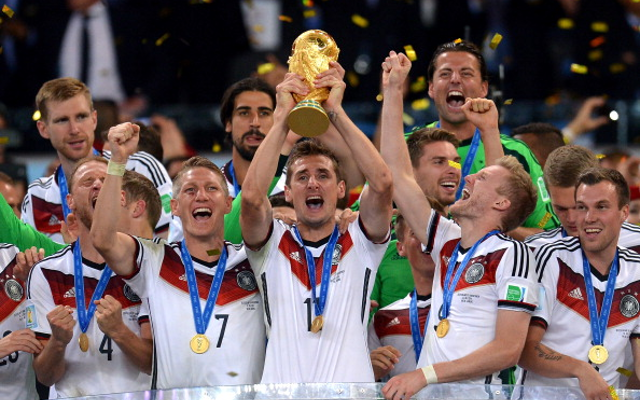Germany win continues recent European dominance.
SEE ALSO: The Top 10 Strikers In The World Right Now!
Germany’s superb World Cup win this summer may prove to be so much more than just one victory in the grand scheme of the game – it may resoundingly confirm a shift of power from South America to Europe in world football.
For the first time in World Cup history, it is now three tournaments in a row that a European side has come away with the trophy. For the first time in World Cup history, a team from Europe has won the competition in South America, thrashing host nation Brazil 7-1 in a remarkable semi-final, and then beating another South American giant in Argentina in the final.
We like to look for symbols and narratives in football, and this certainly feels like it could be the start of a big change in the game that for so long was dominated by the raw talent of those with Latino roots, whose nurturing with street football and lack of other opportunities arguably giving them a significant advantage over their more privileged European counterparts on the international stage. Brazil, Argentina and Uruguay have won nine finals between them, producing some of the most memorable teams and individuals in history along the way. However, they have won just one out of the last five now, while we have also had two all-European finals in a row in 2006 and 2010 – the first time that has happened since the 1930s.
Interestingly, the last two wins by Spain and Germany have owed much to a strong contingent of players from one club – Barcelona and Bayern Munich, respectively. Much was made of the Barcelona connection as the likes of Xavi and Iniesta utterly dominated international football for three tournaments in a row, neatly alongside the dominance at club level of the Catalan giants. In the period between 2008 and 2013, that fine midfield pairing were instrumental in sides that won two European Championships, one World Cup, four La Liga titles and two Champions League trophies between them.
With Germany now, six players that started the World Cup final victory over Argentina were also treble winners with Bayern Munich just a year earlier, while substitute and match-winner Mario Goetze is now also at the club. With La Liga and the Bundesliga flourishing so much with an array of superb homegrown talent, it is no wonder that they have started to find their feet at international level. Few others, even in Europe, can hope to compete with that.
While the Premier League may be getting it wrong by bringing in too many players from overseas, it could also be argued that Brazilian players, for example, are also suffering from being the subject of big-money transfer fees to move abroad. Although there was admittedly a strong Chelsea contingent, for one, in their squad this year, there is a marked difference from the group of players who won in 2002, with the number of home-based players dropping from 12 to just four.
One of the greatest footballing nations in history may now be suffering something of an identity crisis. Welcomed warmly by their adoring fans this summer, the Brazilian players were still largely visitors to their home country, having all played their football in front of crowds around Europe for much of the last few years, traveling a great distance to reacquaint themselves with the country and the culture.
Much of the concern about the decline of the England team is down to club versus country rows, while in contrast the relationships between the two in Germany are excellent. South American leagues may now be at a big disadvantage as their best players get snapped up and ‘Europeanised’ from a young age, resulting in a disjointed national side lacking the fluency and telepathy of their great teams in the past.

COMMENTS